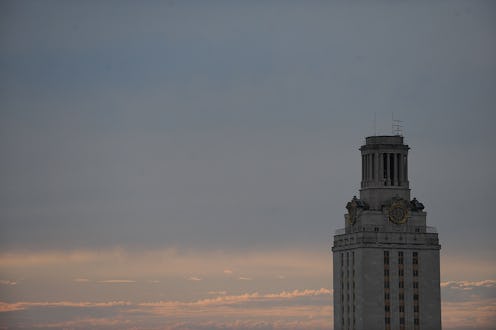News
Texas To Allow Guns On Campus On A Very Somber Day
On Monday, a new Texas campus carry law will go into effect, making the Lone Star State one of just a handful of states to allow the concealed carry of firearms on public college campuses. The law passed through the state legislature back in 2015, but it will take effect on a particularly significant day. Monday also marks the 50th anniversary of the 1966 mass shooting at the University of Texas at Austin.
On August 1, 1966, a lone gunman ascended to the top of UT Austin's iconic clock tower and opened fire on the people below. The attack killed 16 people and injured 30 others before Austin police officers were able to stop the shooter. It was one of the earliest mass shootings on a college campus in the U.S., and reportedly, the first mass shooting during the era of live, national TV news.
If anything, the anniversary of the UT Austin shooting is a reminder that gun violence isn't a new problem. It's something that has plagued the U.S. for generations, and states — and the country as a whole — have been slow to respond. Texas' new campus-carry law is a controversial response that hasn't caught on nationwide.
According to the National Conference of State Legislatures, Texas will join seven other states in a small club of those that allow concealed carry on college campuses. Those states are Colorado, Idaho, Kansas, Mississippi, Oregon, Utah and Wisconsin. In Wisconsin, public institutions are reportedly working within the legislation to ban guns from campus. In Arkansas and Tennessee, university faculty have some freedom to carry a weapon.
Far more states have banned weapons from campus or have recently failed to pass legislation aimed at allowing guns on campus. For instance, Georgia Gov. Nathan Deal vetoed legislation that would allow concealed carry on campuses earlier in 2016. In addition to Georgia, 17 other states ban campus carry, including California, Florida, and North Carolina.
Under the new law, licensed handgun owners will be free to carry their weapons into a public university's classrooms, dorms, or other buildings without disclosing that they have done so. Each school is allowed to come up with certain limitations for implementing the law on its campus, but those rules cannot prohibit permit holders from carrying their weapons. On Friday, university Associate Vice President Bob Harkins issued a statement to the UT Austin community in preparation for the law, noting that the open carry of firearms is not allowed and that some portions of residence halls are off-limits to handguns. He also recognized the controversy caused by the new law:
We have heard and understand the concerns raised by many members of the campus community. We are working to address those concerns within the parameters of the law and to answer the many questions that have been raised about the new law.
The new law and the continued controversy comes at a time when talk of gun laws has achieved national attention. At last week's Democratic National Convention in Philadelphia, lawmakers, law enforcement officials, and victims of gun violence took the stage to support "common-sense" gun reform under Hillary Clinton. At the Republican National Convention a week earlier, speakers — including the executive director of the National Rifle Association — called for the preservation of gun rights. Texas may have a new law on its hands come Monday, but citizens across the country could have a say in the future of gun laws come November.
